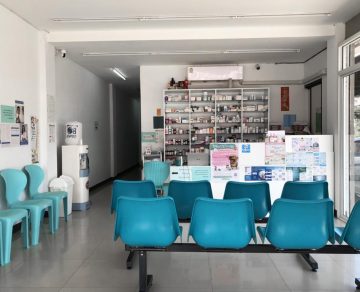เครื่องช่วยฟังเป็นอุปกรณ์ที่สำคัญสำหรับผู้ที่สูญเสียการได้ยิน ซึ่งจะช่วยให้พวกเขาได้ยินและสื่อสารได้ดีขึ้น อย่างไรก็ตาม เครื่องช่วยฟังไม่ได้ถูก และราคาอาจเป็นอุปสรรคสำคัญสำหรับคนจำนวนมากที่ต้องการใช้งาน ในขณะที่ผู้ป่วยบางรายอาจถูกล่อลวงให้ซื้อเครื่องช่วยฟังราคาถูก
Read More Aug
15
Aug
15
ประกันรถยนต์ 2+ ราคาถูก หาซื้อง่ายกว่าที่คิด
ถึงแม้ว่าช่องทางการเลือกซื้อประกันรถยนต์ในปัจจุบันนี้จะมีความหลากหลายและมีความน่าสนใจแต่ละช่องทางด่วนแต่ช่วยทำให้ผู้เอาประกันได้รับความสะดวกสบายในการเลือกรูปแบบความคุ้มครอง วันนี้สำหรับคนที่สนใจจะเลือกซื้อประกันรถยนต์ 2+ ราคาถูกแต่ยังตัดสินใจไม่ได้ว่าจะเลือกซื้อกับแหล่งไหนวันนี้ลองเข้ามาทำความรู้จักและเลือกซื้อกับเรา mrkumka เว็บของเราถือว่าเป็นช่องทาง การเลือกซื้อประกันรถยนต์ที่เชื่อถือได้เปิดให้บริการมาเป็นเวลานานมีลูกค้าให้ความไว้วางใจและเข้ามาใช้บริการกับเราเป็นจำนวนมาก อีกทั้งยังมีรูปแบบประกันรถยนต์ 2+ ราคาถูกจากหลากหลายบริษัทประกันมาให้คุณได้เลือกเรามีบริการเปรียบเทียบราคาเบี้ยประกันหารูปแบบความคุ้มครองที่ผู้เอาประกันสนใจในราคาที่ถูกที่สุดให้กับคุณประสานงานดังนั้นหากคุณสนใจที่จะเลือกซื้อรูปแบบความคุ้มครองประกันรถยนต์ 2+ ราคาถูกและกำลังมองหาช่องทางการเลือกซื้อที่เชื่อถือได้เข้ามาใช้บริการกับเรา mrkumka ได้เลย ซื้อความคุ้มครองประกันรถยนต์ 2+ ราคาถูกกับ mrkumka เมื่อคุณสนใจที่จะเลือกซื้อรูปแบบความคุ้มครองประกันรถยนต์ 2+ ราคาถูกแล้ว ก่อนอื่นเลยจะต้องเข้ามาดูรายละเอียดเกี่ยวกับรูปแบบความคุ้มครองวาดรูปแบบประกันรถยนต์ 2+ ราคาถูกมีให้ความคุ้มครองแบบไหนบ้างมีข้อยกเว้นความคุ้มครองอย่างไรเพื่อที่จะทำให้คุณตัดสินใจได้ง่ายมากขึ้นในการเลือกซื้อประกันรถยนต์ ซึ่งรูปแบบความคุ้มครองที่คุณจะได้รับจากประกันรถยนต์ 2+ ราคาถูกคือความคุ้มครองในชีวิตและทรัพย์สินผู้เอาประกันกรณีที่เกิดอุบัติเหตุบนท้องถนนความคุ้มครองในบุคคลภายนอกกรณีที่เกิดอุบัติเหตุบนท้องถนนเช่นเดียวกัน ความเสียหายที่เกิดจากภัยพิบัติทางธรรมชาติรถยนต์ไฟไหม้รถยนต์ถูกขโมยยังคงได้รับความคุ้มครองตามเงื่อนไขกรมธรรม์ประกันรถยนต์ 2+ ราคาถูกเหล่านี้ เพื่อที่จะช่วยทำให้คุณตัดสินใจได้ง่ายมากขึ้นและทำให้คุณประหยัดเงินในการเลือกซื้อรูปแบบความคุ้มครองคุณสามารถเข้ามาใช้บริการเปรียบเทียบราคาเบี้ยประกันเพื่อหารูปแบบความคุ้มครองที่ต้องการในราคาเบี้ยประกันที่ถูกที่สุดนี่ถือว่าเป็นอีกหนึ่งตัวช่วยดีๆที่ทำให้คุณประหยัดเงินในการเลือกซื้อความคุ้มครองประกันรถยนต์ได้มากขึ้นสำหรับใครที่ต้องการทราบรายละเอียดเพิ่มเติมสำหรับการเลือกซื้อประกันรถยนต์ 2+ ราคาถูกสามารถเข้ามาสอบถามกับทีมงานเว็บ mrkumka ได้เราพร้อมให้คำแนะนำและให้ความช่วยเหลือในทุกๆขั้นตอนการเลือกซื้อประกันรถยนต์ 2+ ราคาถูกนี้เพื่อที่จะช่วยทำให้คุณมีความคุ้มครองที่จะป้องกันอุบัติเหตุหรือความเสี่ยงต่างๆที่อาจจะเกิดขึ้นในระหว่างการขับขี่ แน่นอนว่ามีผู้เอาประกันหลายคนที่สนใจจะเลือกซื้อประกันรถยนต์แต่อาจจะมีความลังเลหรือไม่แน่ใจว่าจะเลือกซื้อรูปแบบประกันรถยนต์ประเภทใดดีคุณสามารถเข้ามาทำความรู้จักฤดูและรายละเอียดรูปแบบความคุ้มครองของแต่ละรูปแบบประกันรถยนต์ที่หน้าเว็บ mrkumka ก่อนได้เพื่อที่จะช่วยทำให้คุณตัดสินใจได้ง่ายมากขึ้น
Read More Jan
14
Jan
14
ปรับพื้นฐาน เพิ่มความเข้าใจแบบก้าวกระโดดด้วยการเรียนอังกฤษออนไลน์ตัวต่อตัว
การฝึกฝนทักษะทางด้านภาษาอังกฤษให้พัฒนาขึ้นมีด้วยกันหลากหลายวิธีด้วยกัน เริ่มตั้งแต่การอ่านหนังสือภาษาอังกฤษ การฟังเพลงสากล การดูหนังที่เป็นเสียงภาษาต่างประเทศ มีซับไทยหรือซับภาษาอังกฤษ การมีเพื่อนชาวต่างชาติทางช่องทางออนไลน์เพื่อช่วยในการฝึกภาษาในชีวิตประจำวัน หรือแม้แต่การดูยูทูปคอร์สเรียนภาษาอังกฤษต่าง ๆ ที่เป็นเนื้อหาสาระที่มีความน่าสนใจ แต่ถ้าหากว่าต้องการที่จะปรับพื้นฐานภาษาอังกฤษของตนเองอย่างถาวร ให้มีความเข้าใจในภาษาอังกฤษแบบก้าวกระโดดแล้วล่ะก็ ยังมีอีกหนึ่งวิธีที่มีความน่าสนใจ นั่นก็คือการเรียนอังกฤษออนไลน์ตัวต่อตัว เรียนอังกฤษออนไลน์ตัวต่อตัวเพิ่มความเข้าใจ เรียนง่าย ได้ผลดี หลาย ๆ คนอาจเกิดคำถามขึ้นมาว่าการเรียนอังกฤษออนไลน์แบบตัวต่อตัวจะช่วยให้ภาษาอังกฤษพัฒนาขึ้นแบบหน้ามือเป็นหลังมือได้อย่างไร ก่อนอื่นต้องบอกเลยว่าการเรียนที่ผู้สอนและผู้เรียนโฟกัสซึ่งกันและกัน มีการโต้ตอบ พูดสื่อสารกันอย่างเหมาะสม เป็นระยะเวลาหนึ่งนั้น เมื่อมีการฝึกอย่างต่อเนื่อง เป็นประจำทุกวัน ทุกสัปดาห์ก็จะทำให้ผู้เรียนสามารถรับเนื้อหาความรู้ สาระต่าง ๆ ที่ผู้สอนถ่ายทอดได้ดีมากขึ้น โดยเฉพาะการเรียนที่เป็นแบบตัวต่อตัว คือไม่มีการเบี่ยงเบนความสนใจจากผู้เรียนคนอื่นที่อาจมีการพูดคุยหรือทำกิจกรรมอื่น ๆ ระหว่างเรียน ทำให้ผู้เรียนสามารถตั้งใจจดจ่อกับสิ่งที่อยู่ตรงหน้าได้อย่างมีประสิทธิภาพ และยิ่งถ้าการฝึกฝนนั้นมีการนำกลับไปทบทวนอย่างสม่ำเสมอแล้ว ก็จะทำให้ทักษะทางด้านภาษาอังกฤษของผู้เรียนเพิ่มขึ้นได้ไม่ยาก การเลือกรูปแบบการเรียนอังกฤษออนไลน์ตัวต่อตัวก็เป็นสิ่งที่มีความจำเป็นเช่นกัน ด้วยการเรียนที่มีด้วยกันหลากหลายรูปแบบ มีเนื้อหาที่แตกต่างกันออกไป สิ่งสำคัญที่เราควรต้องทราบก่อนเลยก็คือตนเองนั้นมีจุดอ่อนหรือจุดแข็งทางภาษาอังกฤษในด้านไหน ต้องการพัฒนาทักษะภาษาอังกฤษในด้านใด เช่นต้องการพัฒนาทักษะทางด้านการฟัง การพูด การสื่อสารในชีวิตประจำวันก็ควรเลือกคอร์สเรียนภาษาอังกฤษที่ฝึกสำเนียงการพูดแบบเจ้าของภาษา คอร์สเรียนที่ได้ฝึกฟังเสียงพูด มีการโต้ตอบด้วยบทสนทนาภาษาอังกฤษ เป็นต้น การเลือกรูปแบบการเรียนที่ใช่แบบตัวต่อตัวจะช่วยให้เราสามารถไปถึงเป้าหมายที่เราตั้งไว้ได้เร็วยิ่งขึ้น สำหรับการเรียนอังกฤษออนไลน์ตัวต่อตัว ไม่เพียงแต่จะทำให้ภาษาอังกฤษของเราพัฒนาได้รวดเร็วขึ้นแล้ว ยังช่วยส่งเสริมความมั่นใจของผู้เรียนในการใช้ภาษาอังกฤษด้วย เนื่องจากในห้องเรียนผู้เรียนจะมีการใช้ภาษาอังกฤษเพื่อพูดคุยกับอาจารย์ในประเด็นคำถาม […]
Read More Aug
16
Aug
16
ยาเคอร่าสามารถป้องกันโควิดได้ จริงไหม?
ในเมื่อไม่นานมานี้ มีกระแสข่าวของยาเคอร่า ที่บอกสามารถป้องกันโควิด 19 ได้ จึงทำให้ประชาชนแห่กันไปซื้อยาเคอร่ามาเพื่อหวังจะป้องกันเชื้อไวรัสประเภทนี้ แต่ไม่นานมากนี้กลับมากระแสข่าวโต้กลับบอกว่า ยาเคอร่า ป้องกันโควิด 19 ได้ เป็นข่าวปลอม หรือ เฟคนิวส์ วันนี้เราเลยมีข้อมูลเกี่ยวกับกระแสข่าวนี้มาฝากกัน ว่าตอนนี้เป็นอย่างไรกันแล้วบ้าง เจ้าของยาเคอร่า ชี้ ยาเคอร่าสามารถยับยั้งโควิดสูงกว่าฟ้าทะลายโจร จากกรณีที่ทางสำนักงานตำรวจแห่งชาตื แถลงผลิตภัณฑ์สมุนไพรเคอร่า (Kerra) ที่มีสรรพคุณสามารถรักษาโควิด-19 นั้น เป็นข่าวปลอมหรือเฟคนิวส์ โดยตอนนี้ทางตำรวจเองก็กำลังอยู๋ในช่วงการรวบรวมพยานหลักฐานเพื่อหาตัวผู้กระทำผิดมาดำเนินคดี แต่เมื่อวันที่ 16 กรกฎาคม 2564 ที่อาคารเฮิร์บ ไลน์ (Herb Line) ที่ซอยประชาชื่น 27 แขวงบางซื้อ เขตบางซื้อ กรุงเทพฯ ทางดร.ภัทร หนังสือ ประธานกรรมการการ บริษัท อีสเทิร์นเฮิร์บ และเวชกรโอสถ เจ้าของบริษัทผลิตภัณฑ์สมุนไพรเคอร่า (Kerra) และ พญ. เกศกมล เปลี่ยนสมัย ทีมวิจัยของทางบริษัท ร่วมกันแถลงข่าว ผลการวิจัยผลิตภัณฑ์สมุนไพรยาเคอร่าว่ามีฤทธิ์ช่วยยับยั้งเอนไซม์ที่ไวรัส โควิด-19 […]
Read More Jun
17
Jun
17
ธุรกิจพลังงานที่จะช่วยโลกของเราให้หายร้อน
ธุรกิจพลังงานนั้นถือว่าเป็นหนึ่งในธุรกิจที่สำคัญต่อประเทศในแต่ละประเทศอย่างมากเลยนะครับ เพราะว่าแต่ละประเทศธุรกิจพลังงานนั้นจะมีผลต่อเศรษฐกิจด้วยเช่นกัน แต่ในบทความนี้เราจะมาพูดถึงเรื่องของ ธุรกิจที่เกี่ยวข้องกับพลังงาน และทำให้โลกของเรานั้นหายร้อนได้นะครับ มาลองดูกันดีกว่านะครับว่าจะมีธุรกิจอะไรบ้าง ธุรกิจโซล่าเซลล์ อย่างแรกเลยนั้นคือธุรกิจพลังงานที่เกี่ยวข้องกับ โซลล่าเซลล์ หรือ ก็คือการสังเคราะห์แสง ที่จะทำให้เรานั้นสามารถใช้ไฟฟ้าได้จากพลังงานแสงอาทิตย์ ซึ่งธุรกิจนี้จะช่วยตอบโจทย์ในเรื่องของภาวะโลกร้อนอย่างมากเพราะว่าไม่ต้องมีการใช้ไฟฟ้าที่มาจากพลังงานโดยตรงทำให้ภาวะโลกร้อนที่เรานั้นเจอ นั้นเจอ ซี่งปัญหานี้ธุรกิจพลังงานโซลล่าเซลล์ หรือ การใช้พลังงานความร้อนจากดวงอาทิตย์มาช่วยนั้นถือว่าตอบโจทย์อย่างมากนะครับ ธุรกิจพลังงาน Eco Car อีกหนึ่งธรุกิจที่เรานั้นอาจจจะรู้จักอยู่แล้วนั้นคือ ธุรกิจ ECO CAR ที่จะช่วยให้โลกของเรานั้นเย็นลงนะครับ เพราะว่าอย่าลืมว่าก๊าซคาร์บอนไดออกไซด์นั้นเกิดขึ้นมาจากควันรถของเราและ ทำให้โลกของเรานั้นร้อนขึ้นอย่างมากเนื่องจากควันรถนั้นเอง ดังนั้นสำหรับการเลือกใช้ ECO CAR นั้นจะช่วยให้โลกของเรานั้นเย็นลงอย่างมากนะครับ ซึ่งถือว่าเป็นอีกหนึ่งธุรกิจที่ค่อนข้างตอบโจทย์อย่างมาก และยังช่วยในเรื่องของการลดโลกร้อนอย่างมากเลยนะครับ ธุรกิจบรรจุภัณฑ์กระดาษ อีกหนึ่งธุรกิจที่ตอบโจทย์อย่างมากสำหรับธุรกิจที่ช่วยในเรื่องของโลกร้อนนั้นคือธุรกิจ บรรจุภัณฑ์กระดาษ เพราะว่าบรรจุภัณฑ์ กระดาษนั้นจะมาแทนบรรจุภัณฑ์พลาสติกที่อาจจะลดน้อยลงอย่างมากในเรื่องของการใช้ เพราะว่าพลาสติกนั้นจะทำให้โลกของเราร้อนอย่างมากนะครับ ดังนั้นธุรกิจที่ค่อนข้างตอบโจทย์ในเรื่องของความร้อนของโลกเราก็เป็นอีกหนึ่งธุรกิจอย่างบรรจุภัณฑ์นั้นเอง ธุรกิจที่เกี่ยวข้องกับพลังานทดแทน อีกหนึ่งธุรกิจที่จะช่วยให้โลกของเรานั้นหายร้อนขึ้นนั้นคือธุรกิจที่เกี่ยวข้องพลังงานทดแทนต่าง ๆ จะช่วยให้พลังงานทดแทน นั้นนอกจากจะช่วยในเรื่องของ “การช่วยลดพลังงานไม่ให้หมดลงอย่างรวดเร็วแล้ว” ยังมีในเรื่องของ “การช่วยลดภาระโลกร้อน” ด้วยนะครับเพราะว่าการที่เรานั้นเลือกใช้พลังงานต่าง ๆ นั้นจะช่วยให้โลกของเรานั้นจะลดความร้อนลงได้ด้วยนะครับ ซึ่งส่วนมากพลังงานที่จะช่วยให้โลกนั้นลดภาวะโลกร้อนนั้นคือในการใช้พลังงานทดแทน แทนการใช้พลาสติก จะช่วยให้โลกของเรานั้นหายร้อน จะเห็นว่ามีธุรกิจที่มากมายในการเปิดขึ้นมาเพื่อให้โลกของเรานั้นหายร้อนนะครับ ดังนั้นเชื่อว่าหลายคนนั้นอาจจะยังไม่รู้นะครับว่าธุรกิจที่เรากล่าวมานั้นเป็นธุรกิจที่เปิดขึ้นเพื่อให้ป้องกันในโลกร้อนได้ด้วยนะครับเพราะว่าปัญหาภาวะโลกร้อนนั้นสำคัญอย่างมากที่ทุกคนไม่ควรจะมองข้ามนะครับ เพราะว่าโลกของเราได้ไม่มีปัญหาในเรื่องของ ภาวะโลกร้อน และทำให้อายุของโลกเรานั้นไม่ลดลงด้วยนะครับ
Read More Jun
11
Jun
11
PRK คืออะไร ควรใช้การเลือกรักษาที่ดี สำหรับดวงตาหรือไม่
การรักษดวงตาของเราด้วย PRK นั้นถือว่าเป็นอีกหนี่งการรักษาของดวงตาของเราที่ไม่สามารถทำเลสิคได้แพทย์จึงจะแนะนำในการเลือกรักษาด้วย PRK แทน และ หลายคนนั้นอาจจะยังไม่รู้นะครับว่า PRK ดังนั้นในบทความนี้เราจะพาทุกคนไปรู้จัก PRK กันมากขึ้น และ เป็นอีกหนึ่งทางเลือกในการรักษาของดวงตาของเราที่ดีหรือไม่ PRK คืออะไร PRK นั้นเป็นหนึ่งในวิธีการรักษาของสายตาที่ผิดปกติ ไม่ว่าจะเป็นสายตาสั้น สายตาเอียง ซึ่งเป็นอีกหนึ่งวิธีที่จะรักษาให้หายได้อย่างถาวร มีคุณภาพในการรักษาเทียบเท่ากับการทำเลสิคได้ด้วยเช่นกัน แต่เนื่องจากว่าว่าบางรายนั้นไม่สามารถที่จะทำเลสิคได้ จึงใช้วิธีการ ลอกผิวกระจกตาที่อยู่ด้านนอกสุด และปรับความโคง เว้า ของผิวกระจกตา เพื่อให้การมองเห็นของเรานั้นอยู่ในเกณณ์ปกตินั้นเอง ทำไมถึงควรเลือกใช้ การลอกสายตาด้วย PRK การลอกสายตาด้วย PRK นั้นนับว่าเป็นการรักษาที่ดี และมีมาตรฐานอย่างมากด้วยเช่นกัน แต่กลับกันในเรื่องของการรักษานั้นเนื่องจากว่าแพทย์นั้นมองว่าการรักษาด้วยการเลสิคนั้นไม่ได้ทำได้กับทุกคน ดังนั้นเรามาลองดูกันดีกว่าครับว่าทำไมเราถึงควรเลือกใช้การรักษาด้วย PRK ช่วยเพิ่มการรักษาเป็นทางเลือกมาขึ้นสำหรับ คนที่กระจกตาบาง โอกาสที่จะเกิดผลข้างเคียง นั้นน้อยกว่าอย่างมากไม่ว่าจะเป็นภาวะตาแห้ง และการรักษาที่ยาก บางคนนั้นรักษาได้ด้วยการเลสิค แต่สำหรับบางคนที่มีภาวะแทรกซ้อนนั้นการเลือกใช้ PRK นั้นตอบโจทย์มากกว่า และ ช่วยเพิ่มโอกาสมากกว่า สามารถแยกกระจกชั้นตาได้ ไม่ว่าจะเป็นผู้ที่มีกระจกตาผิดรูป หรือ จะต้องแยกชั้นกระจกตา ช่วยเพิ่มโอกาสทางอาชีพมากขึ้น เพราะว่าบางอาชีพนั้นจะต้องใช้สายตาที่ปกติในการประกอบอาชีพเช่น นักบิน และ อาชีพอื่น ๆ ดังนั้นจะเห็นว่าการเลือกใช้การรักษาแบบ “PRK” นั้นค่อนข้างตอบโจทย์สำหรับคนที่จะต้องการรักษาดวงตาเป็นพิเศษนะครับ ซึ่งปัจจุบันนั้นผลข้างเคียงนั้นน้อยมาก และ ไม่มีอาการเจ็บตา และ การระคายเคืองตา ถือว่าเป็นอีกหนึ่งในการรักษาที่ดีด้วยเช่นกัน
Read More Apr
11
Apr
11
วิธีเลือกคลินิกเวชกรรมแบบง่ายๆ
หากว่าคุณเป็นอีกคนหนึ่งที่กำลังรู้สึกเจ็บป่วยหรือไม่สบายทางกาย คงกำลังคิดอยู่ใช่หรือไม่ว่าจะเลือกรักษาที่ไหนดี เพราะหากว่าพิจารณาดูแล้ว เราจะพบว่ามีทั้งคลินิกเอกชน และโรงพยาบาลให้ได้เลือกรักษา ซึ่งก็ขึ้นอยู่กับความต้องการของลูกค้านั่นเอง ว่าจะเลือกรักษาที่ใด วิธีที่ดีที่สุด สำหรับคนที่ต้องการให้การรักษาโรคของตนเองไม่ใช่เรื่องยากเกินไปและมองหาคลินิกเวชกรรมดีๆ มีหลักการดังต่อไปนี้ 1.พิจารณาคลินิกที่ตรงกับโรคของเรา สำหรับสิ่งแรกที่หลายคนอาจจะไม่เคยคิดถึงมาก่อนก็คือหลักการเลือกคลินิกที่ตรงกับโรคของเรานั่นเอง ปกติแล้ว บางคนเมื่อป่วยก็อาจจะเลือกไปรักษากับหมอที่ตนเองรู้สึกสนิทใจด้วย ทั้งที่ในความเป็นจริง การรักษาโรค เราควรรักษาให้ตรงกับความถนัดของแพทย์จะดีที่สุด เพราะหากรักษาไม่ตรงกับความถนัดที่แพทย์เชี่ยวชาญ อาจทำให้หายช้า และเกิดการป่วยได้ในภายหลัง 2.เลือกแพทย์ที่มีจรรยาบรรณและมีจริยธรรม การเลือกคลินิกเวชกรรมนั้น สิ่งที่สำคัญที่สุดก็คือการเลือกแพทย์ที่มีจรรยาบรรณหรือจริยธรรม หลายคนคงจะสงสัยว่าแล้วเราจะเลือกแบบใดดี จึงจะตอบโจทย์ เพราะหากว่าสังเกตด้วยตาเปล่า เราคงไม่มีทางรู้ได้เลยว่าแพทย์ท่านใดที่มีจรรยาบรรณและมีจริยธรรมมาก นอกจากจะเคยได้รับการรักษากับแพทย์ท่านนั้น ซึ่งทางที่ดีที่สุดก็คือการสอบถามจากคนที่มีประสบการณ์มาก่อน หรืออ่านรีวิวก็ได้เช่นกัน 3.เลือกคลินิกที่มีความสะอาด เนื่องจากช่วงนี้เป็นช่วงที่เกิดโรคระบาดโคโรน่าไวรัส หรือโควิด -19 ส่งผลให้ความสะอาดเป็นสิ่งที่จำเป็นอย่างยิ่ง ดังนั้นหากจะให้ดี คุณควรเลือกคลินิกที่มีการรักษาความสะอาดเป็นประจำ หรือว่ามีการฉีดพ่นน้ำยาฆ่าเชื้อโรค เนื่องจากว่าการรักษาความสะอาดคือสิ่งที่จะช่วยป้องกันโรคได้ อย่างไรก็ดีคลินิกที่รักษาความสะอาด จะต้องมีการถูพื้นด้วยน้ำยาฆ่าเชื้อ อาทิเช่น เดทตอล รวมไปถึงอีกหลายต่อหลายยี่ห้อ เราไม่จำเป็นต้องเลือกแบบราคาแพงก็ได้ เพราะว่าของราคาแพงหรือราคาถูกก็ไม่แตกต่างกันเท่าไร เราแค่เพียงสำรวจว่าสารเคมีตั้งต้นในนั้นมีความเหมาะสมหรือไม่ 4.เลือกคลีนิกเวชกรรมดีๆ อีกหนึ่งเทคนิคในการเลือกก็คือให้เลือกคลินิกเวชกรรมดีๆ เพราะคลินิกดีๆ จะทำให้เราสามารถมั่นใจได้ถึงคุณภาพของแพทย์และพยาบาลอีกด้วย และนี่ก็คือหลักการเลือกคลินิกที่เปี่ยมไปด้วยประสิทธิภาพ หากว่าคุณต้องการให้การรักษาโรคของคุณหายขาด การใช้หลักเกณฑ์เหล่านี้ไปใช้พิจารณาจะไม่ยากเกินไป และได้ผลอย่างแน่นอน
Read More Apr
07
Apr
07
5 เรื่องที่เราต้องรู้ในการดูแลผู้ป่วย
หลาย ๆ คนนั้นผมเชื่อว่าอาจจะมีการดูแลผู้ป่วย อยู่ด้วยใช่ไหมครับ ? และ เชื่อว่าหลายคนนั้นอาจจะกำลังประสบ และ อาจจะกำลังเป็นคนที่กำลังจะดูแลผู้ป่วย และอาจจะเป็นมือใหม่ในการดูแลผู้ป่วย ด้วยอย่างแน่นอน ดังนั้นสำหรับใครที่กำลังจะดูแลผู้ป่วย ที่เป็นมือใหม่ เรามาลองดูเรื่องที่เราจะต้องรู้ก่อนนะครับว่าในการดูแลผู้ป่วย นั้นเราจะต้องรู้อะไรบ้าง พลังใจคือสิ่งจำเป็น อย่างแรกเลยนั้นคือ “กำลังใจ” คือสิ่งสำคัญอย่างมากนะครับ ยิ่งถ้าเป็นผู้ป่วยติดเตียง หรือ ผ฿ป่วยระยะสุดท้ายนั้น พลังใจนั้นสำคัญอย่างมากนะครับ ดังนั้นเราจะต้องคอยให้กำลังใจสำหรับผู้ป่วยบ่อย ๆ นะครับ อย่าพยายามพูดเรื่องในแง่ลบไว้นะครับ เพราะถ้าหากว่าเราพูดในเรื่องเชิงลบนั้นจะทำให้อาการป่วยแย่ลงได้นะครับ (เพราะว่าจิตใจนั้นมีผลต่ออาการป่วย) ดังนั้นเราจะต้องเข้าใจในเรื่องของกำลังใจก่อนนะครับเพราะเป็นสิ่งสำคัญอย่างมากนะครับ ระยะเวลานั้นน้อยลง ในส่วนต่อมานั้นคือในเรื่องของ “เวลา” นั้นคือสิ่งสำคัญอย่างมากนะครับ เพราะว่าในการดูแลผู้ป่วยนั้นระยะเวลาของเรานั้นจะน้อยลง อย่างเช่นการดูแลตัวเอง หรือ บางทีเราอาจจะต้องลางานมาก็มีด้วยเช่นกัน ดังนั้นเราจะต้องทำความเข้าใจไว้เลยนะครับ ว่าในการดูแลผู้ป่วย นั้นเวลาของเรานั้นจะลดน้อยลงอย่างแน่นอนครับ พยายามหาความรู้เพิ่มเติมมากขึ้น หลายครั้งนั้นเราจะต้องหาความรู้เรื่องต่าง ๆ เพิ่มขึ้นด้วยนะรับ อย่างเช่น โรคติดต่อ หรือ โรคที่อาจจะแทรกซ้อน ได้นะครับ เพื่อคความปลอดภัยของตัวเรานะครับ และ ความปลอดภัยของตัวผู้ป่วยเองก็สำคัญนะครับ หรือแม้กระทั่ง แผลกดทับเองก็อาจจะเกิดอันตรายขึ้นได้นะครับ ดังนั้นเราจะต้องพยายามหาความรู้เพิ่มเติมมากขึ้นนะครับ เพื่อตัวเราเอง และ คนที่เรารักนะครับ ถ้าผู้ป่วยพักที่บ้านควรมีสิ่งอำนวยความสะดวกให้พร้อม ในส่วนต่อมานั้นคือในเรื่องของ ผู้ป่วยติดเตียง […]
Read More Mar
29
Mar
29
แซ่บวัน หนึ่งในร้านอาหาร foodpanda ที่ดีที่สุดในกรุงเทพฯ สายแซ่บต้องไม่พลาด
ได้เวลาเอาใจสายแซ่บที่ชื่นชอบเมนูรสจัด ด้วยการบอกต่อหนึ่งในร้านอาหาร foodpanda ที่ดีที่สุดในกรุงเทพฯ การันตีว่ารสชาติถึงใจ นั่นคือ ร้านอาหารอีสาน “แซ่บวัน” แค่ชื่อก็การันตีความแซ่บแบบดุเดือด โดยใครที่มีโอกาสขับรถไปย่านรัชดาภิเษกบ่อย ๆ อาจจะเคยเห็นร้านอาหารอีสานที่มีลูกค้าแน่นร้านแทบจะตลอดวัน เพราะร้านนี้ขึ้นชื่อเรื่องความอร่อย แถมยังมีเมนูมากมายให้เลือกออเดอร์แบบไม่มีเบื่อ แต่เพราะมีบริการดี ๆ จาก foodpanda ทำให้ไม่ต้องไปต่อคิวรอให้เสียเวลา เพราะ foodpanda พร้อมส่งทุกเมนูจากแซ่บวันถึงมือคุณแล้ว แนะนำเมนูร้านแซ่บวัน หนึ่งในร้านอาหาร foodpanda ที่ดีที่สุดในกรุงเทพฯ เมนูยำและเมนูตำแซ่บสะเทือนลิ้น ออเดอร์เมนูจากร้านแซ่บวันทั้งที แน่นอนว่าต้องสั่งเมนูจัดจ้านเพื่อให้สมกับชื่อร้าน สำหรับเมนูที่ขาดไม่ได้ต้องยกให้เมนูยำต่าง ๆ แต่ละจานบอกเลยว่าอร่อยเด็ด น้ำยำแสนอร่อยรสชาติถึงใจ ที่พลาดไม่ได้คือยำรวมมิตรทะเล จัดเต็มวัตถุดิบสดใหม่แบบไม่ยั้ง โดยเฉพาะปลาหมึกเนื้อแน่นและกุ้งตัวโต หรือหากต้องการชิมปูเนื้อแน่น แนะนำให้สั่งยำปูม้าดอง รับประกันอร่อยซี้ด รวมถึงเมนูยำอื่น ๆ เช่น ยำไข่แดง ยำหอยนางรม ยำไส้กรอก ก็อร่อยไม่แพ้กัน นอกจากเมนูยำแล้ว บอกเลยว่าเมนูตำก็ห้ามพลาด เพราะถึงรสถึงชาติแบบสุด ๆ ไฮไลต์ คือ ส้มตำยกถาด จัดหนักจัดเต็มด้วยส้มตำรสจัดจ้าน จะเลือกสั่งเป็นตำปูปลาร้าหรือตำไทยก็ได้ […]
Read More Mar
06
Mar
06
เช็คเบี้ยประกันรถยนต์ไว้อุ่นใจกว่า
รถยนต์คือยานพาหนะที่แทบจะกลายเป็นสิ่งจำเป็นในชีวิตประจำวันของใครหลายคนไปแล้ว ไม่ว่าบ้านไหนครัวเรือนไหนย่อมต้องมีรถยนต์เพื่อการเดินทาง เพราะให้ความสะดวกสบายและเป็นส่วนตัวมากกว่าการขนส่งสาธารณะอีกทั้งยังเป็นทรัพย์สินชิ้นใหญ่อีกหนึ่งอย่างอีกด้วย แต่ในการจับจองซื้อรถยนต์นั้นไม่ใช่เพียงแค่การจ่ายเงินซื้อตัวรถ แต่ยังมีเรื่องของการดูแลรักษาที่ตามมาด้วย สิ่งที่ขาดไปไม่ได้เลยในการซื้อรถยนต์จึงเป็นการซื้อประกันรถยนต์นั่นเอง ประกันรถยนต์นั้นคืออีกหนึ่งแผนในการดูแลรถยนต์เพื่อให้มีตัวช่วยที่ดีหากเกิดอุบัติเหตุหรือความเสียหายเกี่ยวกับรถยนต์ การเลือกแผนประกันรถยนต์นั้นก็มีหลากหลายตั้งแต่ราคาไปจนถึงความคุ้มครองที่แตกต่างกันออกไป แต่สิ่งหนึ่งที่ผู้ใช้รถยนต์ต้องเจอและอาจเกิดความสงสัยกันบ่อยคือเบี้ยกระกันรถยนต์ เบี้ยประกันรถยนต์คือเบี้ยที่ผู้ใช้รถยนต์ต้องจ่ายให้กับบริษัทประกันภัยรถยนต์เพื่อเป็นค่าตอบแทนให้กับแผนประกันรถยนต์ที่ทางบริษัทประกันรถยนต์ต้องรองรับความเสี่ยงหากเกิดเหตุขึ้น โดยทั่วไปแล้ว เบี้ยประกันรถยนต์จะผันแปรตามวงเงินที่คุ้มครองของแผนประกันรถยนต์ที่เลือกไว้ ดังนั้น ผู้ใช้รถยนต์จึงต้องพิจารณาเช็คเบี้ยประกันรถยนต์ให้เหมาะสมกับกำลังจ่ายของตนเอง อีกทั้งเช็คเบี้ยประกันรถยนต์ให้ละเอียดเพื่อให้ได้ราคาเบี้ยประกันรถยนต์ที่ต้องจ่ายอย่างคุ้มค่ากับวงเงินที่คุ้มครองมากที่สุด เช็คเบี้ยประกันรถยนต์ไว้จึงอุ่นใจกว่า การเช็คเบี้ยประกันรถยนต์นั้นสามารถทำได้ง่ายตั้งแต่ขั้นตอนการหาข้อมูลแผนประกันรถยนต์ อีกทั้งยังทำได้หลายช่องทางตั้งแต่การเช็คเบี้ยประกันรถยนต์ผ่านทางช่องทางออนไลน์ อย่างบนเว็บไซต์ที่บริษัทประกันรถยนต์ได้เปิดให้ผู้ใช้ได้ศึกษาข้อมูลก่อนการตัดสินใจทำประกัน ซึ่งความสะดวกสบายนี้คือการที่ผู้ใช้รถยนต์สามารถเปรียบเทียบราคาของเบี้ยประกันรถยนต์หลายๆ แห่งผ่านทางออนไลน์ได้จากทุกที่ทุกเวลา ทำให้แน่ใจในราคาเบี้ยประกันภัยรถยนต์และแผนประกันภัยรถยนต์ได้ง่ายๆ อีกด้วย แต่ถ้าหากผู้ใช้รถยนต์ยังไม่แน่ใจในการเลือกแผนประกันภัยรถยนต์หรืออาจยังเป็นมือใหม่ อาจเลือกวิธีติดต่อกับทางบริษัทที่สนใจได้โดยตรงทั้งจากเบอร์โทรศัพท์หรือการติดต่อยังสาขาของบริษัทประกันภัย ก็จะสามารถเปรียบเทียบและสอบถามข้อมูลเบี้ยประกันภัยที่ถูกใจได้ง่ายขึ้นและป้องกันความผิดพลาดที่อาจเกิดขึ้นได้อีกด้วย การเช็คเบี้ยประกันภัยจึงเป็นสิ่งสำคัญเพื่อการวางแผนค่าใช้จ่ายในการทำประกันภัยรถยนต์และเพื่อให้ได้มาซึ่งแผนประกันภัยที่คุ้มค่ามากที่สุด
Read More
